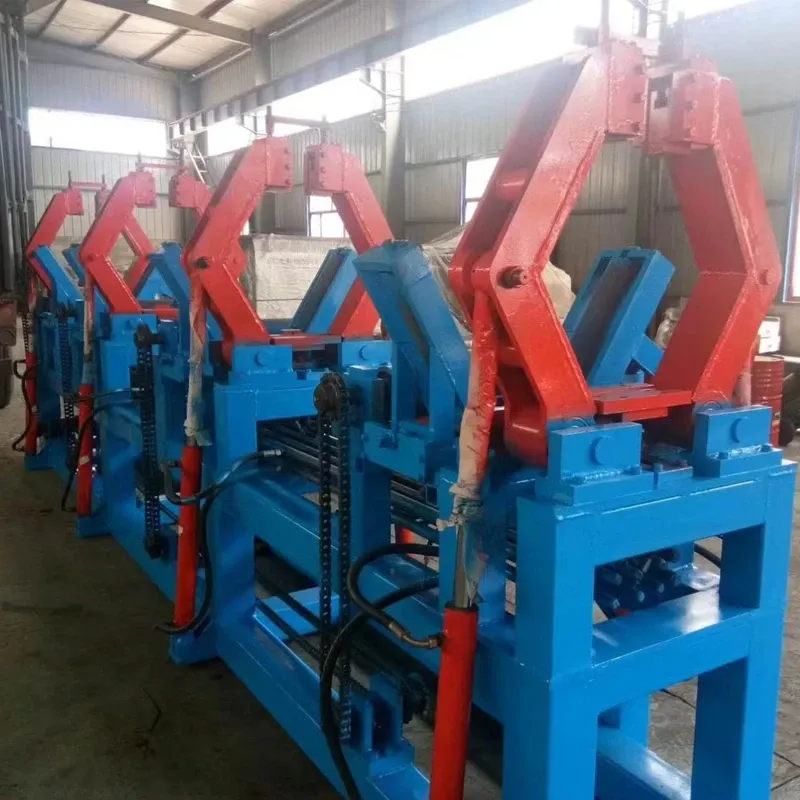Material Handling Efficiency: How Stacking Machine Products Optimize Industrial Workflows
Makina koduese plotësisht automatike është një pajisje paketimi plotësisht e automatizuar e nivelit të lartë, e inovuar në mënyrë të pavarur nga kompania jonë pas prezantimit të teknologjisë së përparuar të huaj. Ai ushqen në mënyrë të barabartë tubacionet e çelikut, përdor sisteme hidraulike dhe sensore motorike për të kontrolluar numrin dhe formën e paletizimit dhe më pas ushqen formën në kokën e makinës së paketimit automatik. Forma fiksohet nga tensioni paraprak i rripit të paketimit të kokës së makinës.

Modern industries rely on specialized machinery to streamline material handling, reduce waste, and enhance productivity. Equipment like the five erw pipe making machine, agriculture pipe making machine, dhe makinë për prodhimin e tubave të aluminit plays a pivotal role in transforming raw materials into precision-engineered components. This article explores how these systems optimize workflows across sectors, emphasizing material compatibility, automation, and sustainability.
ERW Pipe Making Machine: Revolutionizing Structural Fabrication
Të erw pipe making machine (Electric Resistance Welded) integrates five forming stands to produce high-strength steel pipes with unmatched consistency. By cold-forming steel coils into cylindrical profiles and welding seams via high-frequency currents, these machines create pipes ideal for construction, automotive frames, and utility infrastructure. Carbon steel and stainless steel are commonly processed, with thicknesses tailored for load-bearing applications like bridge pylons or hydraulic systems.
Automated feed systems and laser-guided alignment ensure dimensional accuracy, while IoT-enabled diagnostics predict roller wear, minimizing downtime. In renewable energy projects, these machines fabricate galvanized steel pipes for solar farm mounting structures, prioritizing corrosion resistance in coastal environments. Advanced models also handle hybrid materials, such as steel-aluminum composites, expanding their utility in lightweight automotive chassis production.
Agriculture Pipe Making Machine: Sustaining Agro-Industrial Demands
Të agriculture pipe making machine addresses the unique needs of farming and irrigation by producing durable, cost-effective pipes from materials like PVC, HDPE, and reinforced polymers. These machines extrude and cool molten polymers into seamless tubes, which are then perforated or coiled for drip irrigation systems. UV-resistant additives are blended into HDPE during production, ensuring longevity under prolonged sun exposure in open-field farming.
Automated cutting units section pipes into standardized lengths, while inline printers label products with flow capacity ratings. In dairy farming, these machines produce antimicrobial PVC pipes for milk cooling systems, preventing bacterial growth and maintaining hygiene. The integration of recycled plastics into feedstock further aligns with circular economy goals, reducing agricultural waste.
Aisa Tube Making Machine: Precision for Specialized Applications
Të aisa tube making machine (a term often associated with high-precision Asian-manufactured systems) excels in crafting thin-walled tubes for electronics, HVAC, and medical devices. Utilizing servo-driven rollers and TIG welding, these machines process materials like copper, brass, and stainless steel with micron-level tolerances. In semiconductor manufacturing, they produce ultra-clean copper tubes for cooling high-performance chips, where even microscopic imperfections can cause thermal inefficiencies.
Material-specific tooling adapts to varying hardness levels. For instance, diamond-coated mandrels prevent scratching when forming titanium tubes for aerospace fuel lines. Real-time spectral analyzers monitor weld purity, critical for medical-grade stainless steel tubes used in surgical instruments.
Aluminium Pipe Making Machine: Lightweight Solutions for Modern Industry
Të makinë për prodhimin e tubave të aluminit caters to industries prioritizing weight reduction without sacrificing strength. By cold-drawing or extruding aluminum billets, these machines create seamless or welded pipes for automotive, aerospace, and packaging. Alloys like 6061-T6 are favored for bicycle frames and aircraft components due to their high strength-to-weight ratios.
Automated anodizing units add corrosion-resistant layers post-production, while CNC-controlled bending stations shape pipes into complex geometries. In electric vehicle battery packs, aluminum cooling tubes fabricated by these machines dissipate heat efficiently, extending battery life. The use of recycled aluminum scrap as feedstock further enhances sustainability, reducing energy consumption by up to 95% compared to virgin material processing.
FAQS:About Aluminium Pipe Making Machine
How does a erw pipe making machine handle different steel grades?
Erw pipe making machines adjust roller pressure and welding frequency based on steel grade. For high-carbon steels, slower cooling rates prevent brittleness, while austenitic stainless steels require inert gas shielding during welding.
What materials are unsuitable for agriculture pipe making machine systems?
Agriculture pipe making machines struggle with highly abrasive composites. Materials like fiberglass-reinforced polymers require specialized extruders with hardened screws and barrels.
Why choose an aisa tube making machine for medical applications?
Aisa tube making machines achieve ISO 13485-compliant cleanliness levels, essential for biocompatible titanium or stainless steel tubes used in implants or drug delivery systems.
Can aluminium pipe making machines process recycled material?
Yes, aluminium pipe making machines efficiently process recycled scrap, using degassing systems to remove impurities and ensure mechanical properties match virgin alloy standards.
How do agriculture pipe manufacturing machines enhance sustainability?
Agriculture pipe manufacturing machines incorporate up to 30% recycled polymers into feedstock, reducing reliance on virgin plastics and lowering the carbon footprint of irrigation systems.
From the rugged five erw pipe making machine to the precision-focused aisa tube making machine, these systems epitomize efficiency in material handling. By aligning technology with material science, industries achieve faster production cycles, reduced waste, and compliance with evolving environmental standards. Future advancements, such as AI-driven predictive maintenance and closed-loop recycling, will further solidify their role in sustainable industrial workflows.
-
Revolutionizing Pipe Production with Modern MachineryLajmeJun.04,2025
-
Precision in Plastic Injection MoldersLajmeJun.04,2025
-
Precision Cutting with Flying Shear TechnologyLajmeJun.04,2025
-
Portable Metal Roof Roll Forming: Revolutionizing On-Site FabricationLajmeJun.04,2025
-
Mastering Pipe Cutting Laser in Modern FabricationLajmeJun.04,2025
-
Innovations in Welded Gas Pipe TechnologyLajmeJun.04,2025


